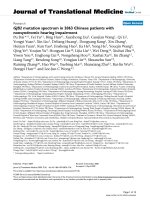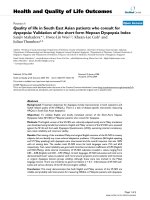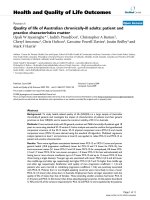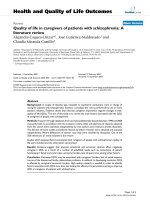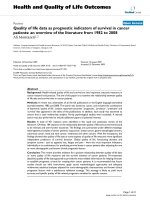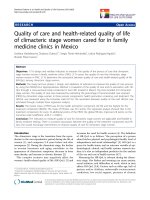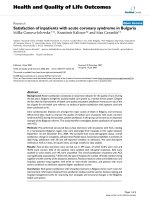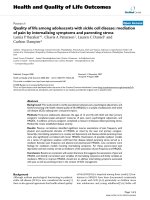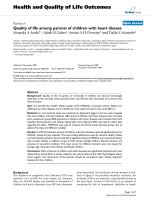báo cáo hóa học: " Quality of life in caregivers of patients with schizophrenia: A literature review" ppt
Bạn đang xem bản rút gọn của tài liệu. Xem và tải ngay bản đầy đủ của tài liệu tại đây (209.11 KB, 5 trang )
BioMed Central
Page 1 of 5
(page number not for citation purposes)
Health and Quality of Life Outcomes
Open Access
Review
Quality of life in caregivers of patients with schizophrenia: A
literature review
Alejandra Caqueo-Urízar*
1
, José Gutiérrez-Maldonado
2
and
Claudia Miranda-Castillo
3
Address:
1
Department of Philosophy and Psychology, University of Tarapacá, 18 de Septiembre # 2222, Arica, Chile,
2
Department of Personality,
Evaluation, and Psychological treatments, University of Barcelona, Paseo Valle de Hebron, 171, 08035 Barcelona, Spain and
3
Department of
Mental Health Sciences, University College London, 67-73 Riding House Street, London, W1W 7EJ, UK
Email: Alejandra Caqueo-Urízar* - ; José Gutiérrez-Maldonado - ;
Claudia Miranda-Castillo -
* Corresponding author
Abstract
Background: A couple of decades ago, hospitals or psychiatric institutions were in charge of
caring for patients with schizophrenia; however, nowadays this role is performed by one or more
patient's relatives. Evidence shows that informal caregivers experience negative changes in their
quality of life (QOL). The aim of this study is to review the main factors associated with the QOL
of caregivers of people with schizophrenia.
Methods: A search through databases from journals published last decade between 1998 and 2008
was performed. In accordance with the inclusion criteria, titles and abstracts of citations obtained
from the search were examined independently by two authors and irrelevant articles discarded.
The full text of those studies considered relevant by either reviewer were obtained and assessed
independently. Where differences of opinion rose they were resolved by discussion. Out of the
258 references, 37 were included in the review.
Studies which assessed factors associated with caregivers of people with schizophrenia's quality of
life were included and the information summarized.
Results: Evidence suggest that physical, emotional and economic distress affect negatively
caregiver's QOL as a result of a number of unfulfilled needs such as, restoration of patient
functioning in family and social roles, economic burden, lack of spare time, among other factors.
Conclusion: Decreased QOL may be associated with caregivers' burden, lack of social support,
course of the disease and family relationships problems. In addition, in developing countries, QOL
is affected by caregivers' economic burden. High quality research is needed in order to identify
factors associated with QOL over time and testing the efficacy of interventions aiming to improve
QOL in caregivers of patients with schizophrenia.
Published: 11 September 2009
Health and Quality of Life Outcomes 2009, 7:84 doi:10.1186/1477-7525-7-84
Received: 27 February 2009
Accepted: 11 September 2009
This article is available from: />© 2009 Caqueo-Urízar et al; licensee BioMed Central Ltd.
This is an Open Access article distributed under the terms of the Creative Commons Attribution License ( />),
which permits unrestricted use, distribution, and reproduction in any medium, provided the original work is properly cited.
Health and Quality of Life Outcomes 2009, 7:84 />Page 2 of 5
(page number not for citation purposes)
Review
Caregiver quality of life
Nowadays family has taken functions which were per-
formed in the past by psychiatric institutions. This change
highlights not only the relevance of emotions and affec-
tions within a family, but also the great amount of burden
experienced by these relatives while taking care of a psy-
chotic patient as well. Thus, "informal care" is playing a
significant role in development and evaluation of health
programs and policies [1].
Main caregiver has been defined as the person belonging
to the patient's informal support system who takes the
care and is responsible for the patient, and who commits
most of his or her time to that task without receiving any
economic retribution [2]. There is plenty of research
about burden on relatives of psychotic patients; however
concern for this group has increased during last decades
[3-5]. Dillehay and Sandys [6] defined family burden as a
"psychological state produced by the combination of
physical work, emotional pressure, social restrictions, and
economic demands arising from taking care for a patient
as well". Burden on relatives of patients with schizophre-
nia has been found associated with an important reduc-
tion in their QOL, causing damage in caregiver's health
condition [7-9].
In 1993, The WHOQOL (The World Health Organization
Quality of Life) Group [10] defined QOL as individuals'
perceptions of their position in life in the context of the
culture and value systems in which they live and in rela-
tion to their goals, expectations, standards and concerns.
It is a wide concept implying many aspects and many
interpretations have come from it. QOL concept com-
prises different dimensions: individual's physical and
emotional health, psychological and social well-being,
fulfillment of personal expectations and goals, economic
assurance, and finally functional capacity to develop daily
routines normally [11,12].
Martens y Addington [13] observed that family members
are significantly stressed as a result of having one of them
with schizophrenia. Ivarsson, Sidenvall, and Carlsson
[14] agreed that burden on a family caregiver is complex
and includes many areas, such as daily life, worries, and
social pressure. In addition, empirical evidence confirms
that caring for a patient with schizophrenia generates eco-
nomic burden on the family. Gutiérrez-Maldonado and
colleagues [15] carried out a study with a Chilean sample
confirming that, disregarding the level of development of
a country; caregivers experience high levels of burden.
In the health field, QOL (a construct closely related to
burden) is one of the most important components associ-
ated with delivering an integral service to an ill person and
their family, emphasizing the subjective perspective held
by the patient and the family. In this context, one of the
main objectives is the development of supporting activi-
ties rather than reducing symptoms and preventing
relapses only.
Until recently, due to the inclusion of new drugs, research
on QOL has been focused on schizophrenia patients
rather than their caregivers. Currently, informal and for-
mal caregivers are being considered as a valuable compo-
nent of an integral treatment for patients, thus their QOL
and burden are being evaluated [16-18].
This review tries to answer the following questions: a)
What variables are related to QOL damage in caregivers of
patients with schizophrenia? b) Does relative's QOL differ
substantially among developed and developing coun-
tries? c) Which objectives should aim at future researches.
Methods
Search Strategy
A systematic search was carried out using the following
electronic databases: MEDLINE via PubMed, Web of Sci-
ence and PsycINFO. The following keywords were used:
quality of life, burden, schizophrenia, families, caregivers,
and a combination of them. The search comprised pri-
mary and secondary studies and was limited to references
published from 1998 to 2008. Potential studies were
included if they considered a primary family caregiver and
focused on caregiver's QOL related to schizophrenia.
Since this review aimed to identify variables related to
QOL in caregivers of patients with schizophrenia, descrip-
tive, cross-sectional and qualitative studies were included.
The hits retrieved by database were: MEDLINE via
Pubmed (73), Web of Science (93) and PsycINFO (49). In
accordance with the inclusion criteria, titles and abstracts
of citations obtained from the search were examined inde-
pendently by two authors and irrelevant articles dis-
carded. The full text of those studies considered relevant
by either reviewer were obtained and assessed independ-
ently. Where differences of opinion rose they were
resolved by discussion. Out of the 258 references, 37 were
included in the review.
Results
Methodological aspects
Most reviewed studies had a "cross-sectional" design
showing a low level of evidence available. The less were of
"prospective cohort" type, only one of them was a "case
control" study, and a study alone used qualitative meth-
odology. To assess caregiver QOL, different methods and
instruments were used; therefore, comparison among
studies was difficult. The amount of caregivers inter-
viewed ranged from 30 to 288. It is likely that some stud-
Health and Quality of Life Outcomes 2009, 7:84 />Page 3 of 5
(page number not for citation purposes)
ies were not sensitive enough to detect any significant
association with caregiver burden and/or caregiver QOL.
The correlations between different variables and car-
egiver's QOL included in the discussion came mainly
from descriptive studies. In order to summarize the results
taking into account the heterogeneity and the poor quality
of the studies, the authors agreed that an association
between any factor and caregiver's QOL was considered in
the discussion when it was found statistically significant
in the original paper (p < 0.05) and was present in more
than 10% of the papers reviewed. This allowed us to dis-
cuss those associations that were significant form a statis-
tical point of view and more frequently studied.
Factors associated with caregiver QOL
Additional file 1 displays associated variables found in
studies on QOL of relatives of patients with schizophre-
nia.
Despite differences among countries, studies carried out
in different parts of the world show similar outcomes. Fol-
lowing we describe the factors that were found associated
with caregivers' QOL.
Several studies stated that appearance of psychotic symp-
toms or the course of the disease produce an important
level of burden [19-37].
Caregivers' health was highly deteriorated. Stress prob-
lems, anxiety, and depression were observed in several
studies [20-34]. Interestingly, Dyck et al. [35] found that
caregivers catch infectious diseases. This could have
occurred due to a deterioration in the caregiver's immune
system.
Working life was also significantly affected. Caregivers
must leave their jobs, modify their working hours or
change to another job. Moreover, in some cases, stress
seemed to be associated with a triple shift: job, household
duties, and care for a patient [36-39].
The last dimension evaluated was economic burden.
Economy issues produce concern in caregivers due to
expenses in different areas, e.g. drug therapy and treat-
ment. Regarding this, there is a difference between devel-
oped and developing countries. In countries such as
Chile, Nigeria, and India caregivers expressed more con-
cern in this dimension, likely caused by scarcity of com-
munity and health resources [5,9,21,22,24,40].
Family dynamics were affected due to the presence of dis-
agreements, conflicts, and even violence among its mem-
bers. In addition, some close relatives might go away
avoiding having to take care of the patient [5,16,21,37,39-
42].
Damage in caregiver social life and a lack of social support
has lead to caregivers complaints towards treatment deliv-
ered by health institutions and their professionals
[5,10,19,21,22,32,34,37,38,40,43,44]. Jungbauer et al.
[22] found that sometimes professionals disqualify infor-
mal caregivers.
Some researches have analyzed cultural variables in pop-
ulations that have not been frequently included in
research. Caregivers belonging to an ethnic minority have
the worst QOL and those from countries with more tradi-
tional families use religion as a way of coping
[29,32,34,43,45].
Finally, most of the studies show that the mother is the
one who takes main care of the patient and has worse
QOL than other type of informal caregivers caused likely
by her caring chores [5,15,19,22,30,35,38].
Conclusion
The variety of methods used in the reviewed studies makes
comparison among them difficult. It would be important
to achieve an agreement regarding what instrument is the
most appropriate to employ in the case of caregivers of
patients with schizophrenia in order to measure their
QOL. In addition, future research is needed going beyond
the cross-sectional design. It should be considered at least
a case-control design having comparative groups clearly
defined and blind (for QOL evaluator), or studies using
self-report instruments to measure this construct and
other variables in which disturbance variables are in con-
trol. This would allow obtaining better evidence about
factors associated with QOL of caregivers of patients with
schizophrenia.
Despite the fact that good quality evidence is required, a
recent trend towards studying this subject on diverse fam-
ily groups can be observed.
Regarding the aims of this review, some similarities were
found in the results obtained from the studies reviewed:
a) What variables are related to QOL damage in caregivers
of patients with schizophrenia?
Main variable was emotional burden on caregivers as a
consequence of their role, lack of social and working sup-
port, course of the disease, and disruptions in family life.
All these factors were associated with a considerable dam-
age of QOL.
b) Does relatives' QOL differ substantially among devel-
oped and developing countries?
The feeling of being exhausted seems to be generalized to
relatives from different countries as well as cost associated
Health and Quality of Life Outcomes 2009, 7:84 />Page 4 of 5
(page number not for citation purposes)
with mental disorders, however, major differences regard-
ing QOL appear to be related to having a better access to
and higher availability of health and economic resources
for these caregivers. In developing countries, economic
burden may be playing an important role in relative's
QOL. Lack of psychiatrist, day hospitals, access to drug
treatments, among others, could generate a considerable
concern in these relatives.
c) Which objectives should aim at future researches?
There is a need for treatment and follow-up as much as
improvements in family intervention programs delivered
by health services. These factors should be considered in
future research in this area. Program design should take
into account socio-cultural characteristics of the popula-
tion attending a health service. Efficacy of such interven-
tions needs to be proved since they could be beneficial not
only for the patients, but also for the caregivers.
This review has limitations. The study design of most
reports was cross-sectional reflecting the lowest level of
evidence. This has the following implications for the
results:
a) Associations found across studies may have been
influenced by different sources of bias making the
internal and external validity of them questionable.
For example, recruitment strategies and sampling var-
ied a lot across studies. Most of the studies employed
purposive samples where interviews were applied only
to those who were willing to participate in a research.
Therefore, caregivers studied may have not been a rep-
resentative sample of caregivers of patients with schiz-
ophrenia.
b) The criteria adopted for including associations in
the discussion might have excluded those that maybe
were clinically significant but did not reach statistical
significance.
c) The descriptive nature of most of the included stud-
ies made the use of quantitative pooling methods (e.g.
meta-analysis) not possible. As mentioned previously,
good quality studies are needed in order to assess the
impact of interventions aimed to improve caregivers
of patients with schizophrenia's QOL.
In summary, it seems that "informal care" is playing an
important role in the care of patients with schizophrenia
and this issue needs to be thoroughly analyzed because of
the high psychopathological risk experienced by informal
carergivers.
Abbreviations
QOL: Quality of life
Competing interests
The authors declare that they have no competing interests.
Authors' contributions
ACU contributed to the design and coordination of the
study. JGM was responsible for primary study design and
supervision of data collection. CMC was a methodologic
consultant, assisted with data analysis and interpretation,
and participated in manuscript editing. All authors read
and approved the final manuscript.
Additional material
Acknowledgements
This research was funded by Fondo Nacional de Desarrollo Científico y
Tecnológico FONDECYT. Project 11075102. Funds were used to pay the
publication, data management and the English translation of the draft.
We thank Alejandro Araya Godoy and Paulina Toledo Carrasco for their
assistance in primary data cleaning and analyzing, and translation of the
manuscript.
References
1. Clark R, Drake R: Expenditures of time and money by families
of people with severe mental illnes and subtance use disor-
ders. Community Ment Health J 1994, 30:145-163.
2. Dwyer J, Lee G, Jankowski T: Reciprocity, Elder Satisfaction and
Caregiver Stress and Burden: The Exchange of Aid in the
Family Caregiveing Relationship. J Marriage Fam 1994, 56:35-43.
3. Yarrow M, Schwart C, Murphy H, Deasy L: The psychological
meaning of mental illness in the family. J Soc Issues 1955,
11:12-24.
4. Kuipers L: Family burden in schizophrenia: implications for
services. Soc Psychiatry Psychitr Epidemiol 1993, 28:207-210.
5. Martínez J, Nadal S, Beperet M, Mendióroz P, grupo Psicost: Sobre-
carga de los cuidadores familiares de pacientes con esquizof-
renia: factores determinantes. An Sist Sanit de Navar 2000,
23:101-110.
6. Dillehay R, Sandys M: Caregivers for Alzheimer's patients: what
are learning from research. Int J Aging Hum Dev 1990,
30:263-285.
7. Fadden G, Bebbington P, Kuipers L: The burden of care: The
impact of funtional psychiatric illness on the patient's family.
Br J Psychiatr 1987, 150:285-292.
8. Kuipers L, Leff J, Lam D: Family work for schizophrenia: a practical guide
London: Gaskell; 1992.
9. Gutiérrez-Maldonado J, Caqueo-Urízar A, Kavanagh D: Burden of
care and general health in families of patients with schizo-
phrenia. Soc Psychiatry Psichiatr Epidemiol 2005, 40:899-904.
10. World Health Organization: Report of WHOQOL Focus Group Work:
WHO (MNH/PSF/93.4) 1993.
11. Garre J, Hernández M, Lozano M, Vilalta J, Turón A, Cruz Ma, Camps
G, López S: Carga y calidad de vida en cuidadores de pacientes
con demencia tipo Alzheimer. Rev Neurol 2000, 31:522-527.
Additional file 1
Variables associated with QOL in family caregivers of patients with
schizophrenia. The table shows the variables associated with QOL in
family caregivers of patients with schizophrenia found in the literature
review [46-53].
Click here for file
[ />7525-7-84-S1.doc]
Health and Quality of Life Outcomes 2009, 7:84 />Page 5 of 5
(page number not for citation purposes)
12. Aguilar M: Estudios de calidad de vida en el marco urbano de
las demencias. Rev Neurol 1998, 28:80-84.
13. Martens L, Addington J: The psychological well-being of family
members of individuals with schizophrenia. Soc Psychiatry Psy-
chitr Epidemiol 2001, 36:128-133.
14. Ivarsson AB, Sidenvall B, Carlsson M: The factor structure of the
Burden Assessment Scale and the perceived burden of car-
egivers for individuals with severe mental disorders. Scand J
Caring Sci 2004, 18:396-401.
15. Caqueo-Urízar A, Gutiérrez-Maldonado J: Burden of Care in Fam-
ilies of Patients with Schizophrenia. Qual Life Res 2006,
15:719-724.
16. Bloch S, Szmukler G, Herrman H, Benson A, Colussa S: Counseling
Caregivers of Relatives with Schizophrenia: Themes, Inter-
ventions, and Caveats. Fam Process 1995, 34:413-425.
17. Barría J: Síndrome de Burnout en Asistentes Sociales del
Servicio Nacional de Menores de la Región Metropolitana.
Psykhe 2003, 12:213-226.
18. Quintana C: El Síndrome de Burnout en Operadores y Equi-
pos de Trabajo en Maltrato Infantil Grave. Psykhe 2005,
14:55-68.
19. Webb C, Pfeiffer M, Mueser K, Gladis M, Mensh E, DeGirolamo J, Lev-
inson D: Burden and well-being of caregivers for the severely
mentally ill: the role of coping style and social support. Schiz-
ophr Res 1998, 34:169-180.
20. Magliano L, Marasco C, Guarneri M, Malangone C, Lacrimi G, Zanus
P, Maj M: A new questionnaire assessing the opinions of the
relatives of patients with schizophrenia on the causes and
social consequences of the disorder: reliability and validity.
Eur Psychiat 1999, 14:71-75.
21. Ohaeri J: Caregiver burden and psychotic patient's perception
of social support in Nigerian setting. Soc Psychiatry Psychitr Epi-
demiol 2001, 36:86-93.
22. Jungbauer J, Angermeyer M: Living with a Schizophrenic Patient:
A Comparative Study of Burden as It Affects Parents and
Spouses. Psychiatry
2002, 65:110-123.
23. Wolthaus J, Dingemans P, Schene A, Linszen D, Wiersma D, Bosch R
Van den, Cahn W, Hijman R: Caregiver burden in recent - onset
schizophrenia and spectrum disorders: the influence of
symptoms and personality traits. J Ner Ment Dis 2002,
190:241-247.
24. Bradley G, Perlesz A, Nguyen A, Singh B, Riess C: Multiple-family
group treatment for England and Vietnamese-speaking fam-
ilies living with schizophrenia. Psychiatr Serv 2006, 57:521-530.
25. Lee T, Yang Y, Chen P, Hung N, Lin S, Chang F, Cheng S: Different
dimensions of social support for caregivers for patient with
schizophrenia: Main effect and stress-buffering models. Psy-
chiat Clin Neuros 2006, 60:546-550.
26. Chien W, Chan S, Morrisey J: The perceived burden among Chi-
nese family caregivers of people with schizophrenia. J Clin
Nurs 2007, 16:1151-61.
27. Awad G, Voruganti L: The Burden of Schizophrenia on Caregiv-
ers. Pharmacoeconomics 2008, 26:149-162.
28. Ochoa S, Vilaplana M, Haro J, Villalta-Gil V, Martínez F, Cruz M,
Casacuberta P, Paniego E, Usall J, Dolz M, Autonell J: Do needs,
symptoms, or disability of outpatients with Schizophrenia
influence family burden? Soc. Psychiatry Psychiatr Epidemiol 2008,
43:612-618.
29. Yeh LL, Hwu H, Chen CH, Chen CH, Wu A: Factors related to
perceived need of primary caregivers of patients with schiz-
ophrenia. J Formos Med Assoc 2008, 107:644-652.
30. Rosenfarb I, Bellack B, Aziz A: A Sociocultural Stress, Appraisal,
and Coping Model of Subjective Burden and Family Atti-
tudes Toward Patients With Schizophrenia. J Abnormal Psychol
2006, 115:157-165.
31. Schmid R, Schielein T, Spiessl H, Cording C: Burden of siblings of
inpatients with schizophrenia. Psychiatr Prax 2006, 33:177-183.
32. Gutiérrez-Maldonado J, Caqueo-Urízar A: Effectiveness of a psy-
cho-educational intervention for reducing burden in Latin
American families of patients with schizophrenia. Qual Life
Res 2007, 16:739-747.
33. Grandón P, Jenaro C, Lemos S:
Primary caregivers of schizo-
phrenia outpatients: Burden and predictor variables. Psychia-
try Res 2008, 158:335-343.
34. Hanzawa S, Tanaka G, Inadomi H, Urata M, Ohta Y: Burden and
doping strategies in mothers of patients with schizophrenia
in Japan. Psychiatry Clin Neurosci 2008, 62:256-263.
35. Dyck D, Short R, Vitaliano P: Predictors of Burden and Infec-
tious Illness in Schizophrenia Caregivers. Psychosom Med 1999,
61:411-419.
36. Espina A, González P: Intervenciones familiares en la esquizof-
renia. Cambios en la sintomatología y el ajuste social. Revista
Salud Mental 2003, 26:51-58.
37. Mubarak A, Barber J: Emocional expressiveness and the quality
of life of patients with schizophrenia. Soc Psychiatry Psychitr Epi-
demiol 2003, 38:380-384.
38. Fresán A, Apiquian R, Ulloa R, Loyzaga C, García-Anaya M, Gutiérrez
D: Ambiente familiar y psicoeducación en el primer episodio
de la esquizofrenia: Resultados preliminares. Revista Salud
Mental 2001, 24:36-40.
39. Thara R, Kamath S, Kumar S: Women with schizophrenia and
broken marriages-doubly disadvantaged? Part II: Family per-
spective. Int J Soc Psychiatr 2003, 49:233-240.
40. Kung W: The Illness, Stigma, Cultue or Immigration? Burden
on Chinese American Caregivers of Patients with Schizo-
phrenia. Families in Society: J Contem Human Serv 2003, 84:547-557.
41. Castilla A, López M, Chavarría , Sanjuán P, Canut P, Martínez M, Mar-
tínez J, Cáceres J: La carga familiar en una muestra de
pacientes esquizofrénicos en tratamiento ambulatorio. Rev
Asoc Esp Neuropsiq 1998, 18:621-642.
42. Adams J, Nand V, Le Reun C, Mudge M, Crowley S, Eggleston A,
Schrover R, Brown A: The impact of schizophrenia on caregiv-
ers: burden of illness and quality of life. In Proceedings of the
ISPOR 2nd Asia-Pacific Conference: 5-7 March 2006; Shanghai University
of Melbourne. North Ryde NSW: Australia; 2006.
43. Magliano L, Fadden G, Madianos M, Caldas de Almeida J, Held T,
Guarneri M, Marasco C, Tosini P, Maj M: Burden on the families
of patients with schizophrenia: results of the BIOMED I
study. Soc Psychiatry Psychiatr Epidemiol 1998, 33:405-412.
44. Stanley S, Shwetha S: Integrated Psychosocial Intervention in
Schizophrenia: Implications for Patients and Caregivers. Int
J Psychosocial Rehabilitation 2006, 10:113-128.
45. Magaña S, García J, Hernández M, Cortez R: Psychological distress
among Latino family caregivers of adult with Schizophrenia:
The roles of burden and stigma. Psychiatr Serv 2007, 58:378-384.
46. Wu E, Birnbaum H, Shi L, Ball , Kessler R, Moulis M, Aqqarwal J: The
Economic Burden of Schizophrenia in the United States in
2002. J Clin Psychiatry 2005, 66:1122-1129.
47. Roick C, Heider D, Bebbington P, Angermeyer M, Azorin J, Brugha T,
Kilian R, Johson S, Toumi M, Kornfeld A, the EuroSC Research
Group: Burden on caregivers of people with schizophrenia:
comparison between Germany and Britain. Br J Psychiatry
2007, 190:333-338.
48. Sefasi A, Crumlish N, Samalini P, Kinsella A, O'Callaghan E, Chilale H:
A little knowledge: Caregiver burden in schizophrenia in
Malawi. Soc Psychiatry Psychitr Epidemiol 2008, 43:160-164.
49. Wing Kay Tang V, Kau Leung S, Chiu-Wa Lam L: Clinical correlates
of the caregiving experience of Chinese Caregivers of
patients with schizophrenia. Soc Psychiatry Psychiatr Epidemiol
2008, 43:720-726.
50. Lauber C, Eichenberger A, Luginbühl P, Keller C, Rössler W: Deter-
minants of burden in caregivers of patients with exacerbat-
ing schizophrenia. Eur Psychiat 2003, 18:285-289.
51. Laidlaw T, Coverdale J, Fallon I, Kydd R: Caregivers' Stresses
When living together or Apart from Patients with Chronic
Schizophrenia. Community Ment Health J 2002, 38:303-310.
52. Van Wijngaarden B, Schene A, Koeter M, Becker T, Knapp M, Kund-
sen H, Tansella M, Thornicroft G, Vázquez J, Lasalvia A, Leese M, EPSI-
LON study group: People with Schizophrenia in Five
Countries: Conceptual Similarities and Intercultural Differ-
ences in Family Caregiving. Schizophr Bull 2003, 29:573-586.
53. McDonell M: Burden in Schizophrenia caregivers: impact of
family psychoeducation and awareness of patient suicidality
- Families and Couple Research. Fam Process 2003, 42:91-103.
